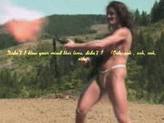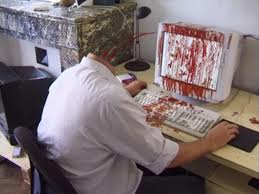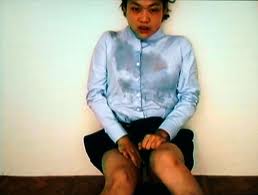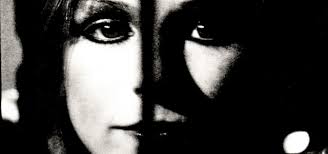
Still: Vacancy, Matthias Müller, 1998
Part of a series of
programs on the production of space inspired by architectural theory, urban
planning, landscape architecture and their intersections with experimental film
and video.
What if film is not
necessarily a simulacrum of reality but a way of perceiving the space we
inhabit? Our lives are spent on the split-level between the forms of
architecture and movements of city planning: the inside of the city versus the
outside of the city. This is a curatorial experiment in reading the abstracted
texts of urban spatial dynamics, exploring the notion that architecture equals
the art of the frame and that the art of the frame equals film. Featured
artists: Ito Takashi, Gordon Matta-Clark, Tirtza Even, Matthias Müller, Sarah
Morris, Julio Soto, Ian Toews, Jesper Fabricious and others. (80
Minutes)
Selected screenings
San Francisco Cinematheque at Yerba Buena Center
for the Arts
California College of the Arts

Still: Muktikara, Jeanne Liotta, 1999
Part of a series of programs on the production of space inspired by architectural theory, urban planning, landscape architecture and their intersections with experimental film and video.
"[P]hotographs remind us that landscape is not an act of fate but of human choice, and seem to ask, 'What would you like this landscape to become, bearing in mind what it was and what it is?'" (Philippe Arbaïzar) The works in this program focus on re-presenting the 'natural' landscape as a site of information exchanges. By framing the landscape and its horizon line, the image begins to function as site of potentials - a virtual space inhabiting pasts, presents and futures. Featured artists: David Rimmer, Oskar Fischinger, Jeanne Liotta, Olivo Barbieri, Steven Topping, Thomas Comerford, Kurt Kren, Deirdre Logue, Megan Michalak and others. (80 minutes)
Selected
Screenings
San Francisco Cinematheque at Yerba Buena Center for the Arts
California College of the Arts

Still: Buildings and Grounds/The Angst Archive, Ken Kobland, 2004
Part
of a series of programs on the production of space inspired by architectural
theory, urban planning, landscape architecture and their intersections with experimental
film and video.
Ken
Kobland: Frames of Reference - Buildings and Grounds / The Angst Archive (2004), continues Kobland's long
concern with using framed landscapes and urban spaces as building blocks for
the contemplation of the human condition. This award-winning piece explores
placeless-ness by juxtaposing both appropriated and original images and sounds.
What emerges from these contrasts is a language of loss, of "[t]ransience,
consciousness and desire. Between the landscapes and the thoughts, there is,
more often than not, a distance, disbelief or irony." With Vestibule (in three episodes) and Frame (1977-8). (80 min.)
Selected
Screenings
San Francisco Cinematheque at Yerba Buena Center for the Arts
California College of the Arts

Still: Slow Space, Klaus W. Eisenlohr, 2001
Part of a series of
programs on the production of space inspired by architectural theory, urban
planning, landscape architecture and their intersections with experimental film
and video.
The works in this program reveal Klaus
W. Eisenlohr's concern with the spatial practice of filmmaking and
the body in architectural and urban environments. The Sky Above Alexanderplatz (1996) and Local Time + 2 1/2 (1999) are
explorations of the urban environment strongly related to the artist's
photographic work on architecture. These earlier films anticipate themes in his
most recent project realized during his residence of two years in Chicago. Slow Space - The Interviews (2001)
investigates the intellectual debate over the value of public space in the
postmodern city with interviews of Deborah Stratman and
Thomas Comerford, amongst other artists. (80 min.)
Selected
Screenings
San Francisco Cinematheque at Yerba Buena Center for the Arts
California College of the Arts

Still: still/here, Christopher Harris, 2000
Part
of a series of programs on the production of space inspired by architectural
theory, urban planning, landscape architecture and their intersections with experimental
film and video.
Christopher Harris's award-winning, eloquent still/here (2000) examines suppressed histories. it documents urban loss and alienation in St. Louis through lingering shots of empty lots, abandoned houses and gutted businesses. These images are accompanied by reflective thoughts from interviews and a haunting score performed by Chicago jazz bassist, Tatsu Aoki. Paired with the beautifully meditative New York Portrait: Chapter Two (1980-81) by Peter Hutton. Together, these films inspire thoughts of the ephemeral city by alternately building it up and taking it apart.

Still: Site Visit, Maïa Cybelle Carpenter, 1999
These films are really dirty: developed in a dishpan in a dark barn, mingled with colorful chemicals and dried in tree branches, attacked with sandpaper and paper clips, ink-stained by smudgy fingers and packed into an optical printer. It is the intimate, physical process of making these films that characterizes their content and sets them apart from other experimental films. These moving images bear the actual imprint of the filmmaker’s body. Manipulations presents films that highlight the raw sculptural qualities of this plastic medium. Featured artists: Sarah Abbott, Christopher Chong, Lee Krist, Jeanne Liotta, Deirdre Logue, Mary Beth Reed, Jennifer T. Reeves, Naomi Uman, Karen Vanderborght, and others. (80 min.)
“Manipulations consists of films torn, tinted, twisted and otherwise tweaked, literally bearing the mark of their makers’ hands (and probably, other body parts).” – Mark J. Huisman, Village Voice, Nov. 1998.
Selected screenings
MIX NYC at Anthology Film Archives
The Blinding Light Cinema of Vancouver
Art Institute of Chicago
InterMedia Arts Center of Minneapolis

Still: The PSA Project, Cynthia Madansky, 2004
These innovative documentary shorts use unconventional methods to investigate their subject matter. The filmmakers challenge our notions of the production of history and memory. From Abigail Child’s appropriated family history in The Future is Behind You to Benita Raphan’s delightful animated musings on Buckminster Fuller in The Critical Path to Nurjahan Akhlaq’s hauntingly beautiful Death in the Garden of Paradise, we see how images can construct memory. Till Passow’s The Ecstatic meditates on the transformative powers of a pilgrimage while Gloriana Severdija’s Night takes us on a sweeping journey through nocturnal Berlin. Including Cynthia Madansky’s The PSA Project. (90 min.)
Selected screenings
San Francisco International Film Festival at Kabuki Theatres and Pacific Film
Archive

Still: Legal Errorist, Mara Mattusckha, 2005
The films in this program are marked by a beautiful and ingenious sensitivity
to their subjects. They articulate the subtleties of light, form, content and
montage in ways that celebrate the moving image. From Tirtza Even’s urban space
wizardry in Icarus, to Leighton Pierce’s sublime video manipulations
in Viscera, to Lisl Ponger’s politicized constructions of
race, ethnicity and class in Phantom Foreign Vienna, to Mara Mattushka’s
delightful collaboration with choreographer Chris Haring in Legal
Errorist, be prepared to have your retina tickled and your thoughts provoked.
Including Cynthia Madansky’s PSA Project, Penny Lane’s We Are the
Littletons: A True Story, Kerry Laitala’s Torchlight Tango, and James T.
Hong’s The Form of the Good. (90min.)
Selected
screenings
San Francisco International Film Festival at Kabuki Theatres and Pacific Film
Archive

Still: The Joy of Life, Jenni Olson, 2005
"The changing light of San Francisco is a sea light, an island light..."- Lawrence Ferlinghetti. Get ready to be seduced by the changing qualities of light and the sublime landscapes of San Francisco in Jenni Olson's 16mm feature-film debut. A hybrid of experimental, documentary and narrative filmmaking styles, this unique film charts the life, loves and losses of a sensitive butch dyke, lyrically narrated by Los Angeles artist, actor and director Harriet "Harry" Dodge (By Hook or by Crook). A compelling narrative and magnificent landscape cinematography are skillfully interwoven through a personal account of loves lost and gained and a rumination on the making of Frank Capra's Meet John Doe. Olson's background as a film historian shines through in this moving juxtaposition of a Hollywood-scripted story of suicide and the narrator's attempts to reconcile grief over a friend's suicide. in both the Hollywood and 'real-life' stories, the Golden Gate Bridge is a central character with its own complex history that is explored further in the documentary portion of the film. This heartfelt story comes full circle in its final revelation: The landscapes of our environment often play themselves out in our emotional geographies. (65 min.)
Selected
screenings
San Francisco International Film Festival at Kabuki Theatres and Pacific Film
Archive

This international selection of experimental shorts features manipulations of appropriated footage, creations of alternate parallel worlds and meditations on the meaning of family. Films include, It’s Not My Memory of It: Three Recollected Documents (Julia Meltzer & David Thorne) An investigation of secrecy, memory and classified documents; Papillon d’amour (Nicolas Provost), a mesmerizing manipulation of Rashomon; imAgo (Nikos Veliotis) which questions television’s role as a creator of idealized images; You Define Single File (Random Touch), a cryptic symbol-laden message from space; The Greater Vehicle (Robert Fox) An ode to group salvation through public transport; Martin (Bill Basquin), a formal study and a sociological vignette; Not Too Much Remember (Tony Gault), exploring the power of storytelling; Papa Blue (Charlene Shih), the story about a father and daughter’s journeys through depression; and The Happy Three Family (Karen Vanderborght) a surreal spin on the biblical tale of The Three Wise Men. (90 min.)
Selected
screenings
San Francisco International Film Festival at Kabuki Theatres and Pacific Film
Archive

Still: Dad's Dead, Chris Shepherd, 2003
Come explore the landscapes of nature and the human mind. Be prepared for some surprise endings and life lessons not to be forgotten. In Victor Quinaz's Chinese Dream, a young man spends his life in endless toil. His sweat seeds a dream that even his overbearing boss cannot stifle. Jung Min-Young's The Way is a quiet, beautifully animated tale of an old railroad crossing-gate master and his reaction to a terrible accident. Hare-Hunting's contemplative story about a young boy and his grandfather coming to terms with the death of a loved one is beautifully rendered by Igor Voloshin. Dad’s Dead by Chris Shepherd is a multilayered animated film in which a young man tries to piece together fragmented moments from the past through a series of ghostly remembrances. Inspired by Poe’s The Raven, Tallulah H. Schwab's surreal comedy The Man in the Cupboard, turns into an intense battle over a secret garden. Also includes Séverine Cornamusaz's My Mother’s Motorbike and Igor Ivanov's Bugs. (90 min.)
Selected screenings
San Francisco International Film Festival at Kabuki Theatres and Pacific Film
Archive

Still: Love Song #1, Art Jones, 2001
Art Jones’s provocative music videos, documentaries on hip hop history, and vj collaborations with Soundlab, DJ Spooky, and Anti-Pop Consortium, all question the powers and politics invested in pop culture. From his work as a member of Not Channel Zero in the early 90s to digital cross-pollinations with the new media collective ITEL, Art Jones challenges stale academic critiques of American commodity culture. Screening tonight are two of his music video trilogies: Love Song #1 with music from the Delfonics, Cibbo Matto and Ol’Dirty Bastard and Love Song #2 (War Songs) featuring the sounds of Radiohead and Earth, Wind & Fire. Completing the evening Art Jones will perform a live audio accompaniment to his most recent work 7/11, a documentary essay made during a trip to Hong Kong for a media conference where Jones’ was trying to be a good tourist in a moment of perpetual doubt. It’s the romance of the East, loving and hating your country, and finding your inner American at the convenience store. (90 min)
Selected screenings
San Francisco Cinematheque at Yerba Buena Center for the Arts
Pleasure Dome, Toronto

Still: Mon Lapin Bleu (Honey Bunny), Pierre-Yves Clouin, 1999
From bursts of perspective trickery to homoerotic celebrations of the male body and philosophical musings on public versus private, the award-winning videos of Pierre Yves Clouin never cease to delight. His witty examinations of the quotidian elements of life bring transcendental revelations combined with laughter. He shows us that as viewers we have become lazy with the way we understand perspective in our spectatorship. Whether he is playing with the framing and eroticisation of the male body or showing us a succession of seemingly random images of the public with intimate voiceovers, Pierre Yves manipulates our viewing expectations so that we look askew. "Alone in front of the camera, and without a word, I spy on myself in the monitor during the action. I am double: seer and seen. As if freedom from surveillance meant inventing, within surveillance itself, an illusion that subverts the watching eye." - P.Y.C. (75 min.)
Selected screenings
San Francisco Cinematheque at Yerba Buena Center for the Arts

Still: Self Portrait, Frank Theys
*co-curated with Karen Vanderborght
Belgium qué? The heart of Europe, its capital Brussels is the capital of the European Community. NATO has a 'thing' going on here: never-mind the nukes tucked away in secret basements...From a country known for it's chocolates and beer, the Flemish versus the French (opposites attract), we find work that incorporates elements of experimental electronic music, fashion and stylized performances. As an ode to the sound collaborations in many of these works, this selection is structured as a DJ-set, with dance parts, more melancholic moments, pure noise eruptions and silent resting points to mark the measures.Featured artists: Anouk De Clercq, Kiila, Ryoji Ikeda, Thomas Köner, Antonin de Bemels, Stéphane Aubier & Vincent Patar, Daniel Daniel, Lucy Grauman, Manon De Boer, Julie Morel, Nicolas Dufranne, Karen Vanderborght, Alexandra Dementieve & Mark Mancha, Yves Bernard, Claude Cattelain, Frank Theys, Pascal Baes and Dora Garcia. (80 min.)
Selected screenings
San Francisco Cinematheque at Yerba Buena Center for the Arts

Still: Untitled (Eels), Patty Chang, 2001
Are we Post-Feminism? Is the 1970s fight for
gender equality ongoing? Are we moving into an era of Future Feminists,
unfettered by constructions of gender? Paired with L.T.T.R.'s program Let the Tape Roll, these recent
pieces engage in dialogues of feminism through the varied approaches of
practice and performance. Antonia Baehr's Erika in Amerika looks at the struggle to make a film as a
foreigner in the US when one is perceived as a feminist performance artist. Ene
Liis Semper's Oasis and
Patty Chang's Untitled (Eels) mix
endurance art with strong statements made visible through montage. Nightshade and Hole-Space by Megan Michalak
make an unsettling comment about the formation of identity. Additional works
by Miranda July,
Ximena Cueves, Dora Garcia and Deborah Edmeades. (80 min.)

Still: What these ashes wanted, Phlip Hoffman, 2001
Canadian filmmaker Philip Hoffman has been making films for the past twenty-five years. He has been engaged in the education and inspiration of many young filmmakers through his courses at Sheridan College, York University and his artisinal film workshops at his rural Ontario farm. Hoffman's films have been described as 'experimental diarist cinema', an intimate first-person collision of fiction, documentary, and formal experimentation. This hybrid approach to his artistic practice presents a cinema of slippages. It questions the reality of representation through the daily material of life, and the material properties of the film medium, to explore themes of memory, family and loss. Including a monograph of the same title with essay by Robert Craig, an interview between Philip Hoffman and Barbara Sternberg and the full text of What these ashes wanted. Editors, Maïa Cybelle Carpenter and Steven Jenkins.
Phillip Hoffman Program #1: What these
ashes wanted
Opening Series: Before the screening begins, 12 boxes of film, each pasted with
an image (not representational of the contents), are placed in order by the
audience. Hoffman will then splice them together in the 'decided on' order to
form a unique film. With this communal and interactive ordering, that places
the "starting experiences of the present - light, rhythm, and color",
the audience and film come together in the moment. "What these ashes
wanted (2001) places flesh on the poet Ann Carson's words, '...death lines
every moment of ordinary time.' With this work Hoffman resides in an acutely
intimate time, a daily practice of loss lived precariously between the terror
of psychic disintegration and the provisional solace taken through public
rituals of mourning. The film is not a story of surviving death, but rather of
living death through a heightening of the quotidian moments of every day
experience." - Karyn Sandlos, Catalogue for Images Festival, Toronto, 2001.
Phillip Hoffman Program #2: Somewhere
Between
Through the years, Hoffman's films have built upon a dialogue of personal
history and memory. His films bring together formal strategies that encompass
both the conceptual and the accidental. Somewhere Between Jalostotitlan
and Encarnacion (1984), passing through/torn
formations (1988), ?O,Zoo! (The Making of a Fiction
Film) (1986), and river (1979-89) negotiate this developing
sense of the daily process of living loss and integrating a multiplicity of
meanings of death into everyday life.
Selected screenings
San Francisco Cinematheque at Yerba Buena Center for the Arts